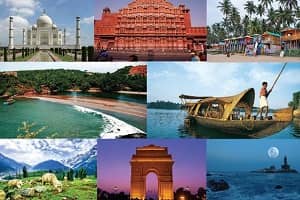Last Updated on 10/08/2023
Recycling waster, tapping solar and wind power to become energy – efficient, offering linen reuse programmes, and more – hotels are leaving no stone unturned to make sure that they do not take their environment for granted.
Eco-tourism came as a wave a few years ago and has today taken the entire travel industry by storm. Right from destinations to hotels, everyone is trying their best to integrate sustainable practices to be able to play their part in environmental conservation. There is an awareness of the fact that with tourism on a rise, there is a greater consumption of natural resources, which in turn could be disastrous to the planet as a whole.

Green Certificate
Right from planning a hotel to finally opening its doors to guest, there is a whole list of things that are being taken in account to ensure that a property is eco-friendly in every regard. In fact, hotels in India are looking towards adhering to the guidelines set by LEED (Leadership in Energy and Environment Design) – the internationally recognised third-party verification of green buildings awarded by the United Sates Green Building Council and the Indian Green Building Council (IGBC).
In India ECOTEL@ is a prestigious environmental certification designed by HVS’ Sustainability Service specifically for the hospitality sector, which offers assistance in setting and achieving green targets for hospitality business and chains. The ECOTEL@ Certification is based on five areas namely environment commitment, waste management, energy management, water management as well as employee education and community involvement.
It’s All About Experience
CGH Earth is the pioneer of eco-tourism in India. Today, the group has a number of properties across peninsular India and is managing at least a dozen properties, including the exotic Bangaram Island in Lakshadweep. The man behind it all – Jose Dominic, MD, CGH Earth – shares how he made the group what it is today. A charted accountant by qualification, Jose joined this family-owned hotel business, which had its first property, Casino Hotel in Wellington Island, Cochin.
“When we started working on Bangaram Island in Lakshadweep, we thought of keeping its natural beauty intact and started working on a model that focused on providing an environment and service that was as local as possible. We used the local products right from the onset, like using coconut thatched roofs instead of those made with concrete. We recruited people from the island and even served neighbourhood cuisine instead of international food,” say Dominic.
However, he believes that real luxury is to enjoy a holiday in its true essence – acres of space, unspoilt nature and an experience of local culture. Dominic continues, “When the hotel opened in 1988, we quoted a price of US$180, same as that offered by The Oberoi, Mumbai. Initially, it was difficult to explain to the travel agents, but when guests came to us after experiencing the property, they asked us to stay as we are even if we decide to increase the price. This gave us confidence and hence shifted the entire paradigm. Today, the definition of luxury has changed. A holiday is not only a memorable experience but a transformative experience.”
“In 1991 we opened the Spice Village in Kerala, where we followed the same rules of keeping everything natural,” he said. The model found instant success and CGH Earth today has a tagline that reads ‘experience hotels’ and boasts around 14 properties in India. Dominic reveals why they changed the name Casino Group of Hotels (CGh) to CGH Earth. “We decided to use Earth for our three core values, which are 1) nature is sacred, 2) involving local community, 3) adopting local ethos. CGH, on the other hand, expands to Clean, Green and Healthy.”
One would be surprised that none of the properties at CGH Earth have a television, and Dominic is proud of the fact. “It is our most commented on and complained about feature,” he laughs. “However, it is essential to the model we work on, offering an experience that makes the simple things in life extraordinary,” he said.
Leading the way
Inspired by the green philosophy, ITC hotels have been the torchbearer for eco-tourism, truly abiding by their tagline that reads Responsible Luxury. In fact, ITC Hotels is the first hotel chain in the world with all its ten Luxury properties LEED@ Platinum certified. “What sets ITC apart is its global acknowledgement as an exemplar is sustainable practices. It is the only company in the world of its size, to achieve the three major global environmental distinctions of being carbon positive, water positive and solid recycling waste positive,” Says Niranjan Khatri, General Manager – Welcomenviron Initiatives, ITC Hotels.
While the decision to follow a green path is exemplary, to be marketing it as luxury is a different ballgame altogether. “The dynamic that combined luxury and sustainability demanded clear vision and resolve. It took serious deliberations and a determined undertaking to demonstrate that the union of luxury and sustainability tapped into the zeitgeist and in fact showed the way ahead, for the hospitality industry as a whole,” says Khatri.
Ecolodges
A new concept of sustainable tourism has taken shape in the form of Ecolodges, not just in India but in other counties as well. Hitesh Mehta, President, HM Design, is one of the world’s leading practitioners and researchers on ecotourism physical planning, landscape architectural and architectural aspects of Ecolodges. He defines Ecolodges as, “low-impact, nature-based accommodations of five to seventy-five rooms that protect the surrounding environment; benefit the local community; offer tourists an interpretative and interactive participatory experience; provide a spiritual communion with nature and culture and are designed, constructed and operated in an environmentally and socially sensitive manner.”
In India Taj Safaris has made a name for itself as far as successful Ecolodges are concerned. They provide guests with the ultimate interpretive wildlife experience, based on a proven sustainable ecotourism model.
How to go Green?
It takes a lot to put the green ideology into practice and hotels are trying their best to take good care of the environment. Manju Sharma, Director, Jaypee Hotels, agrees, “We at Jaypee hotels believe in creating an environment-friendly architectural marvel across all our properties, along with the sustained green initiatives carried on a regular basis by our group. “She adds, “At Jaypee Hotels, employees planted saplings and took the responsibility to maintain the plants. The hotel will also be using green foliage, rather than using cut flowers to avoid wastage of water.” Apart from this, Jaypee has also taken a number of other initiatives like installation of energy efficient lighting system, waste refrigerant with R—134a. The group has also invested in rainwater harvesting system and have also taken initiatives for noise management.
ITC manifests responsible luxury in all its properties through many ways. 55 per cent of the total electrical energy demand in ITC is met through renewable sources i.e. wind and solar energy. “The energy we produce through our wind farms is sufficient to light up a 1400 km stretch of highway, for a year,” claims Khatri.
Jose Dominic too propagates recycling waste. He says, “At EGH Earth all biodegradable waste is converted in fuel and fertilizer.” In fact, the Christmas decorations at CGH Earth were done using recycled paper and waste material.
The Chalets, a Welcome Heritage Resort, located 22kms away from Shimla, has also taken green initiative seriously. Amish Sud, Director, Chalets, Naldehra, says that the entire resort is constructed on mountains without harming or cutting their original structure. “The resort has three greenhouses and approximately 300 varieties of plants and trees are grown through the winter months and even have plants ready for the summers,” he said. Taking of solar energy, he revealed, “The solar panels help us maintain the water temperature of the swimming pool at no extra cost. “Sud further added, “Flooring of restaurant and some rooms has been done by the recycled scrap wood.”
The property also has an ATP (affluent treatment plant) and a bio gas plant. ATP recycles waste water from the kitchen, washrooms and laundry. “The ATOP regenerates 12000 to 14000 litres of water a day which we use for the gardens and lawn, “said Sud.
The naturalist team at Pashan Garh, under Taj Safaris, has created a water recycling system to recycle the grey water from the staff village and further use it for the vegetable garden. Inspired by Ngorongoro Crater Lodge, Pashan Garh also has a garbage incinerator, which provider’s ash that is combined with the compost to produce organic fertilizers for the vegetable garden.
Another property by Taj Safaris, Banjaar Tola Kanha, in partnership with the Forest Department has undertaken a project aimed at providing training to local ‘honey hunters’ to educate them about eco.


 Call
Call WhatsApp
WhatsApp Enquiry
Enquiry